Share

Human Restoration Project
54: Making the Switch to Ungrading (feat. Abigail French, Dr. Susan Blum, and Dr. Laura Gibbs)
Today, we're deep diving into ungrading. In episode 5, we looked at the gradeless movement and the pedagogy that surrounds it, and now we're looking at how it's incorporated, and the non-academic benefits of implementing it. To be clear, when I say "ungrading" - I'm referring to the movement away from grades. This doesn't necessarily mean that the class does not issue at grade at all. Typically, this means that grades are as limited as possible, as in one final grade at the end of a year, with opportunities to redo assignments or reach that goal in multiple ways.
Almost every classroom one visits today will have a chart on the syllabus which breaks down grades.
- Homework: 30%
- Tests: 40%
- Classwork: 20%
- Participation: 10%
- With opportunities for extra credit.
First, I don't blame educators for setting things up this way - it's the way it's almost always done. It's the dominant way of thinking about grading. But there are a litany of issues with categorical grades. Does a student who never completes homework really not understand the content, or are they just disobeying instructions to do work at home? If a student never passes a test, but does great in their classwork, are we grading their content knowledge or their anxiety levels?
Abigail French, a veteran public school teacher focusing on sixth grade, whose beginning her journey into ungrading after unrest with the traditional system.
Dr. Susan Blum, an anthropology professor at the University of Notre Dame, author of I Love Learning; I Hate School": An Anthropology of College, who utilizes ungrading in the classroom and is soon publishing a work on gradeless learning.
Dr. Laura Gibbs, a professor at the University of Oklahoma, who teaches mythology and folklore and epics of ancient India . Laura has been teaching these classes online since 2002 which have always been ungraded.
- Alfie Kohn, “Punished by Rewards” (Discussion)
- Monte Syrie, Project 180
- Teachers Going Gradeless
- Dr. Susan Blum’s website
- Cathy Davidson
- Chapter on Ungrading - Laura Gibbs (from Dr. Susan Blum’s upcoming work)
- Dr. Laura Gibbs’ website
- Dr. Laura Gibbs’ Course Page
- Dr. Laura Gibbs’ Feedback/Mindset resources for students
- Dr. Laura Gibbs’ students’ work
More episodes
View all episodes
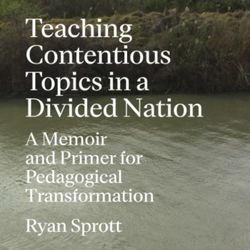
169. Teaching Contentious Topics in a Divided Nation w/ Ryan Sprott
01:14:05||Ep. 169Our conversation today is with educator, author, and Director of National Faculty at PBLWorks, Ryan Sprott, about one of the most contentious topics in education today, that is Teaching Contentious Topics in a Divided Nation: A Memoir and Primer for Pedagogical Transformation, which is also the title of his self-published book. In this conversation we be talk about his experience teaching an inquiry approach to teaching contentious topics. In part time project-based inquiry, his students in Texas, of all places, engaged with some of the most difficult open-ended, wicked questions around, as Ryan refers to them, “A question to open hearts and minds”–What is the purpose of a border and what has shaped your answer to this question? How can we improve energy policy and what has shaped your answer to this question? And what is the purpose of school and what has shaped your answer to this question? Students visited the Texas border with Mexico, worked with immigrant aid organizations and hosted dialogue with Border Patrol agents. They visited Texas oil fields to speak with oilmen on the ground, engaged in interviews, documented their experiences in field journals, created collaborative community art projects, and so much more. You’ll hear student testimonials about how they came away transformed forever by the experience. Ryan Sprott @ PBLWorksTeaching Contentious Topics in a Divided Nation (Amazon)
168. "It's Like a Baby Jail!" Power & Early Childhood Education w/ Dr. Chloë Keegan
01:01:55||Ep. 168I’m joined today by Dr Chloe Keegan. Chloe Keegan is Lecturer of Early Childhood Education in the Froebel Department of Primary and Early Childhood Education in Maynooth University, Ireland.Dr Keegan is an early childhood expert with over a decade of experience as an educator, researcher, and policy advocate. Her work focuses on children's rights and power, play and participation, and influencing practice and policy in early education. She completed her doctoral thesis at Maynooth University, developing an innovative method using GoPro cameras to involve children as co-researchers in studying power dynamics. Her research also explores the impact of play bans on children’s well-being, moral development, the influence of stereotypical media on children’s views of sex, gender, and race, and participatory art-based methods in children’s research and video-based reflective practices.Connect w/ Dr Keegan on LinkedInFull thesis: It's Like a Baby Jail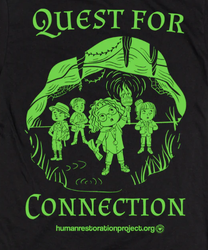
Conference to Restore Humanity! Quest for Connection 2025 Trailer
03:39|https://www.humanrestorationproject.org/conference “True light is dependent on the presence of other lights. Take the others away and darkness results. Yet the reverse is not true: take away darkness and there is only more darkness. Darkness can exist by itself. Light cannot.” ― N.K. Jemisin, The Broken Kingdoms (as read by Zoe Bee)In stressful, uncertain times, when cynical powers attempt to divide and isolate us, community and solidarity are acts of resistance. But there are no superheroes here, and no simple answers to be found, only the Quest for Connection. In 2025, we’re responding to the need for community and solidarity in uncertain times by turning Conference to Restore Humanity into a model for humanizing critical discourse and dialogue: bringing together students and teachers, researchers and doers, thinkers and visionaries to explore complex topics in education and illuminate a path forward together.Our virtual Conference to Restore Humanity 2025 runs July 21st through the 23rd. To make this year as accessible and sustainable as ever, we’ve cut the ticket price to just $50. You can learn more about Conference to Humanity and register on our website at humanrestorationproject.org/conferenceNebula Nostalgia by FSM Team feat. < e s c p > | https://www.free-stock-music.com/artist.fsm-team.htmlhttps://escp-music.bandcamp.comMusic promoted by https://www.free-stock-music.comCreative Commons / Attribution 4.0 International (CC BY 4.0)https://creativecommons.org/licenses/by/4.0/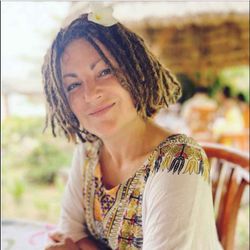
167. Beyond Anthropology For Kids w/ Nika Dubrovsky
37:30||Ep. 167My guest today is Nika Dubrovsky. Nika is an artist and writer whose work has been exhibited internationally, her children’s books have been translated into several languages and, remarkably, as you’ll hear in the episode, Nika is directly responsible for bringing Russian translations of Dr. Suess to post-Soviet Russia.Nika is the co-creator of Anthropology For Kids alongside her late husband: Anthropologist, best selling author, and activist, David Graeber, who passed away suddenly in 2020. A4Kids.org is an open-source platform which experiments with new educational formats. After David's passing, Nika also founded the David Graeber Institute as a platform to develop ideas and projects that continue his legacy.Most of Nika’s projects are dedicated to the building and maintaining of social relationships, among which are the “Museum of Care”, a nomadic ‘anti’ institute, and the Playground of the Future, a collaborative and interactive art project imagining playgrounds as a space of collectivity and care. “Playgrounds are vital public spaces,” she writes, “—they bring communities together, bridging generations and social divides. They’re also about fun and play, which is exactly the kind of atmosphere we need when making collective decisions. A network of community-built playgrounds, designed around Visual Assemblies, could become spaces where people gather, play, and make decisions together.”https://museum.care/playgrounds-notes-from-the-curator/ Anthropology For Kidshttps://museum.care/ Radical Playgrounds: From Competition to CollaborationCities Made Differently (MIT Press)David Graeber Institute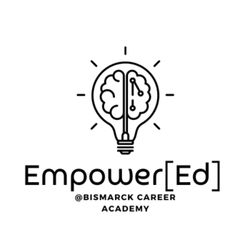
166. Showcase: Spotlight on Bismarck Public Schools' Empower[Ed]
48:16||Ep. 166This is the latest in our “spotlight series”, the first of 2025, where we reach out to schools who are engaged in awesome work, and talk to teachers, school leaders, and students about it to shine a light, inspire, and influence others to do the same. As with all learning, process is the point, not perfection, and there’s so much to learn from these schools as we reimagine education in our communities.Empower[Ed] is a personalized, competency-based education program designed to give high school juniors and seniors control over their learning. We integrate core academic subjects with real-world, community-embedded projects and Career and Technical Education (CTE) courses. Students primarily work independently, demonstrating mastery through projects that align with their passions and career interests. Empower[Ed] fosters learner agency, helping students build critical skills like problem-solving, time management, and collaboration, while crafting personalized learning paths that prepare them for success beyond high school. It’s a flexible, self-directed learning experience aimed at making education more relevant and engaging. Empower[Ed] School PageEmpower[Ed] Community Impact ArcGIS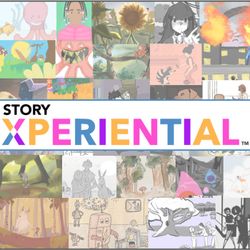
165. From Pixar to the Classroom: Teaching Storytelling w/ Story Xperiential
43:51||Ep. 165With the help of Teacher-Powered Schools, Socol-Moran Partners, Stimpunks, and What School Could Be, we’ve completed the lineup for our 4th annual virtual Conference to Restore Humanity for July 21-23, focused this year on the Quest for Connection. Tickets are just $50 and you can find out more info at humanrestorationproject.org/conferenceWe’re excited to have members of the team from Story Xperiential with us for today’s episode, which was recorded way back in 2024. Developed by veterans from Pixar and Khan Academy, Story Xperiential brings the art of professional storytelling into the classroom, giving students the tools to craft and share their own stories using the same creative process as major studios.The program is structured to fit into school schedules, offering a two-part curriculum: Storytelling Essentials, where students develop a story outline into a story reel, and Mastering Storytelling, where they expand their work into a full narrative. Through self-paced lessons, hands-on projects, and a moderated peer feedback system, students not only learn the technical aspects of storytelling but also gain confidence in their creative abilities.One unique aspect of Story Xperiential is how it can be integrated into every subject area, aligning with interdisciplinary content standards -- bringing together social studies and ELA, for example, or STEM and fine arts -- while also fostering skills like collaboration, critical thinking, and visual communication. In this episode, we’ll explore how Story Xperiential is being implemented in schools, hear about the impact it’s having on students, and discuss how storytelling can be a powerful tool for learning and self-expression.You’re gonna be hearing a few voices in this conversation. HRP director Chris McNutt is hosting this one, who you’re probably used to hearing on this show, and he’ll be talking to a few people on the StoryX team:Dennis Henderson VP of Education and StrategyChief Technical Officer, Tony DeRoseAnd Chief Learning Officer, Brit CruiseYou can learn more and sign your students up at https://www.storyxperiential.com/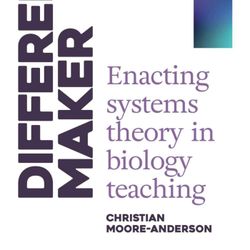
164. Sensemaking and Cybernetics in Classroom Teaching w/ Christian Moore-Anderson
53:23||Ep. 164With the help of Teacher-Powered Schools, Socol-Moran Partners, Stimpunks, and What School Could Be, we’ve officially announced our 4th annual virtual Conference to Restore Humanity for July 21-23, focused this year on the Quest for Connection. If you’re interested in joining us, tickets start at just 50 bucks and you can find the full lineup at humanrestorationproject.org/conferenceToday I’m joined by Christian Moore-Anderson. And I wanted to have Christian on to talk about the ideas that drive his teaching practice and that he shares in his book, Difference Maker: Enacting systems theory in biology teaching. While that title may seem daunting, Christian’s teaching would immediately look and feel to observers like “just good teaching.” But that's just the tip of the iceberg. Informing his theory and practice of teaching is a set of related ideas that I was largely unfamiliar with before encountering it in his book: cybernetics, systems theory, and enactivism. Cybernetics is simply a feedback loop. Just as someone steering a ship adjusts the rudder based on feedback from the ocean, so too does good pedagogy depend on what Christian calls “recursive teaching”, or a constant feedback loop of action, interpretation, and learning between teachers and students. You can connect with Christian on BlueSky @cmooreanderson.bsky.social.Difference Maker: Enacting Systems Theory in Biology Teaching - Christian Moore-AndersonChristian's Recommended Reading:From Being to Doing: The Origins of the Biology of Cognition - Humberto Maturana, Bernhard PörksenThe Pragmatic Turn: Toward Action-Oriented Views in Cognitive Science Edited by Andreas K. Engel, Karl J. Friston and Danica Kragic Understanding Systems: Conversations on Epistemology and Ethics - Heinz von Foerster The Cybernetic Brain: Sketches of Another Future - Andrew Pickering Runaway: Gregory Bateson, the Double Bind, and the Rise of Ecological Consciousness - Anthony Chaney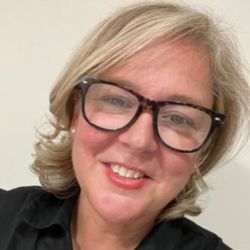
163. Inquiry, Play, and Early Childhood Education w/ Heidi Echternacht
01:00:00||Ep. 163If you go back through the HRP podcast archives, and I encourage you to do just that, you’ll see that we’ve covered just about every topic imaginable in the world of education, with some that keep returning again and again. One area you’ll probably notice a regrettable gap is in early childhood education, PreK-early elementary. One reason is that it’s just out of the experience of the two high school social studies teachers who started the podcast, and another is that foundationally, at least for the classrooms I’ve visited since, PreK-early elementary tends to get a lot more right about developmentally appropriate instruction and schooling than the middle and high school grades that follow. That’s a large part of why I reached out to my guest today to help unpack the ideas that make early childhood education such a powerful and important part of a child’s life.Heidi Echternacht is co-founder of Kinderchat, a weekly professional conversation, resource library, and online network for early childhood advocates and educators. Created and led by teachers, Kinderchat has hosted global discussions between and among professional educators and in-service teachers for over ten years. Author of The Kinderchat Guide to the Classroom, Heidi has been an educator of children for over 20 years and currently teaches second grade in Princeton, New Jersey.Kinderchat SubstackKinderchat.orgConnect with Heidi on BlueskyKinderchat GuidesIn Dialogue with Reggio EmiliaPeter Gray - Free to LearnVisible Learners - Mara Krechevsky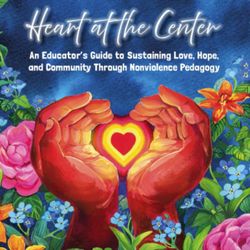
162. Sustaining Love, Hope, and Community Through Nonviolence Pedagogy w/ Mike Tinoco
46:27||Ep. 162Today we're joined by Mike Tinoco. Mike is a full time public school teacher from California, and author of Heart at the Center: An Educator's Guide to Sustaining Love, Hope, and Community Through Nonviolence Pedagogy. Gholdy Muhammad called the book "an urgent call for truth, love, and justice for every educator and community member who deeply dreams of and seeks peace.” Further, Mike is a certified Kingian Nonviolence and Center for Nonviolent Communication (CNVC) trainer who provides workshops around the country. miketinoco.comHeart at the Center: An Educator's Guide to Sustaining Love, Hope, and Community Through Nonviolence Pedagogy